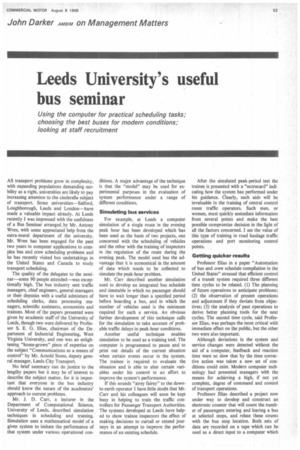Leeds University's useful bus seminar
Page 55

If you've noticed an error in this article please click here to report it so we can fix it.
Using the computer for practical scheduling tasks; choosing the best buses for modern conditions; looking at staff recruitment
AS transport problems grow in complexity, with expanding populations demanding mobility as a right, universities are likely to pay increasing attention to the cinderella subject of transport. Some universities—Salford, Loughborough, Leeds and London—have made a valuable impact already. At Leeds recently I was impressed with the usefulness of a Bus Seminar arranged by Mr. Antony Wren, with some appreciated help from the extra-mural department of the university. Mr. Wren has been engaged for the past two years in computer applications to complex bus and crew scheduling problems and he has recently visited bus undertakings in the United States and Canada to study transport scheduling.
The quality of the delegates to the seminar—some 90 people attended—was exceptionally high. The bus industry sent traffic managers, chief engineers, general managers or their deputies with a useful admixture of scheduling clerks, data processing managers, scientific assistants, economists and trainees. Most of the papers presented were given by academic staff of the University of Leeds, though two were delivered by Professor S. E. G. Elias, chairman of the Department of Industrial Engineering, West Virginia University, and one was an enlightening "home-grown" piece of expertise on the subject "Communications as a means of control" by Mr. Arnold Stone, deputy general manager, Leeds City Transport.
No brief summary can do justice to the lengthy papers but it may be of interest to describe the subject matter, for it is important that everyone in the bus industry should know the nature of the academists' approach to current problems.
Mr. J. D. Carr, a lecturer in the Department of Computational Science, University of Leeds, described simulation techniques in scheduling and training. Simulation uses a mathematical model of a given system to imitate the performance of that system under various operational con
ditions. A major advantage of the technique is that the "model" may be used for experimental purposes in the evaluation of system performance under a range of different conditions.
Simulating bus services
For example, at Leeds a computer simulation of a single route in the evening peak hour has been developed which has been used as the basis of two projects, one concerned with the scheduling of vehicles and the other with the training of inspectors in the regulation of the route during the evening peak. The model used has the advantage that it is economical in the amount of data which needs to be collected to simulate the peak-hour problem.
Mr. Carr described another simulation used to develop an integrated bus schedule and timetable in which no passenger should have to wait longer than a specified period before boarding a bus, and in which the number of vehicles used is the minimum required for such a service. An obvious further development of this technique calls for the simulation to take account of probable traffic delays in peak-hour conditions.
Another useful technique enables simulation to be used as a training tool. The computer is programmed to pause and to print out details of the current situation when certain events occur in the system. The trainee is required to evaluate the situation and is able to alter certain variables under his control in an effort to improve the system's performance.
If this sounds "airey fairey" to the downto-earth operator I have little doubt that Mr. Carr and his colleagues will soon be kept busy in helping to train the traffic controllers for Passenger Transport Authorities. The systems developed at Leeds have helped to show trainee inspectors the effect of making decisions to curtail or extend journeys in an attempt to improve the performance of an existing schedule. After the simulated peak-period test the trainee is presented with a "scorecard" indicating how the system has performed under his guidance. Clearly, such aids will be invaluable in the training of central control room traffic operators. Such men, or women, must quickly assimilate information from several points and make the best possible compromise decision in the light of all the factors concerned. I see the value of this type of training in road haulage traffic operations and port monitoring control points.
Getting quicker results
Professor Elias in a paper "Automation of bus and crew schedule compilation in the United States" stressed that efficient control of a transit system required three different time cycles to be related. (1) The planning of future operations to anticipate problems; (2) the observation of present operations and adjustment if they deviate from objectives; (3) the analysis of past operations to derive better planning tools for the next cycles. The second time cycle, said Professor Elias, was perhaps the most critical with immediate effect on the public, but the other two were also important.
Although deviations in the system and service changes were detected without the aid of a computer, feedback and reaction time were so slow that by the time corrective action was taken a new set of conditions could exist. Modern computer technology had presented managers with the means for achieving a high, if not yet complete, degree of command and control of transport operations.
Professor Elias described a project now under way to develop and construct an electronic counter that will count the number of passengers entering and leaving a bus at selected stops, and relate these counts with the bus stop location. Both sets of data are recorded on a tape which can be used as a direct input to a computer which




































































































